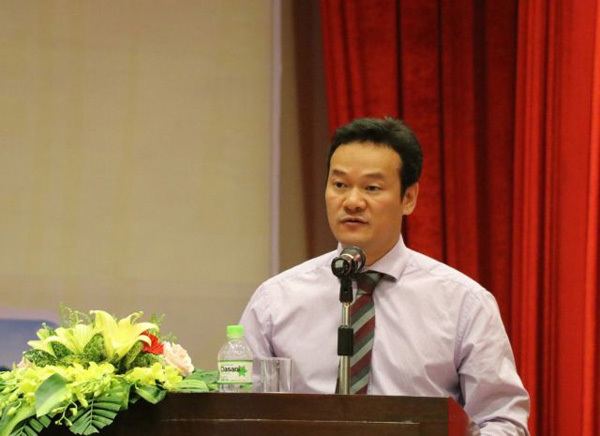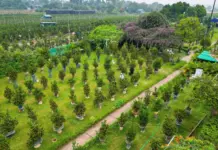Following is an extraction of Vietnam News Agency’s interview with Mai Phan Dung, head of the Department of Cultural Diplomacy and UNESCO under the Ministry of Foreign Affairs and secretary-general of the Vietnam National Commission for UNESCO (VNCU) about the new title.
 |
| Mai Phan Dung, Head of the Department of Cultural Diplomacy and UNESCO under the Ministry of Foreign Affairs and Secretary-General of the Vietnam National Commission for UNESCO Vietnam. VNA/VNS Photo Duc Phuong |
How do you evaluate the UNESCO decision to recognise Dak Nong Geopark?
For all UNESCO titles in general and the Global Geopark title in particular, whenever a new title is awarded and recognised, the heritage treasure of humanity has been enriched. This means another heritage will be honoured, preserved and have its value upheld. Global Geopark is a noble and meaningful heritage title of UNESCO. It honours the values of geoscience and geomorphology under strict criteria, contributing to scientific research on the changes of the earth’s crust, ecosystems and climate.
This title also honours the beauty of local landscapes, natural wonders, culture and biodiversity. It demonstrates a model of sustainable socio-economic development that many countries, especially developing countries, are pursuing.
By participating in the Global Geoparks Network, countries have the opportunity to conserve and promote the value of their geological heritage and boost geological and cultural tourism activities, develop community economy and improve people’s living conditions while preserving and protecting natural resources and ecological environment of the Global Geopark.
The UNESCO recognition of Dak Nong as a Global Geopark is a meaningful breakthrough in the process of socio-economic development of Dak Nong Province and Vietnam.
It is the honour and pride of people and authorities in the province as it contributes more favourable conditions to strengthening provincial sustainable socio-economic development, promoting tourism and confirming local tourism brands. However, Dak Nong should comply with all UNESCO regulations and Vietnamese law in preserving and promoting this noble heritage title.
What was the process for Vietnam to develop and submit a dossier to UNESCO for the approval of Dak Nong Geopark as the Global Geopark?
During the process of developing, submitting and campaigning for the dossier to be approved, Vietnam faced both advantages and disadvantages. The process attracted close attention and direction of the provincial Party Committee, People’s Council and the people’s administration at all levels. It was also supported by the ministries, agencies and central authority, especially the VNCU, the Institute of Geosciences and Mineral Resources, and experts in the country and abroad. Along with that was also the People’s Committee of Dak Nong Province’s activeness and initiatives to protect and preserve the environment, natural resources and cultural heritage in the area. After discovering the unique geological and cultural values of the geopark, the province conducted research and decided to build a complete dossier for it.
Before, Vietnam had been successful in building and advocating for UNESCO to recognise Dong Van Karst Plateau Geopark in Ha Giang Province and Non Nuoc Cao Bang Geopark in Cao Bang Province as Global Geoparks. Thus we have accumulated adequate experience in the process of making dossiers and advocating for the Global Geopark title.
In addition, we also have a network of reputable domestic experts who possess good qualifications and relationships with others in the global expertise network field of geological heritage. These were the basic advantages that helped strengthen the profile of Dak Nong Geopark to be globally recognised as it is today.
However, the process of building and submitting the dossier to UNESCO also faced many difficulties.
First, the title of the Global Geopark is a new one and it aims to promote the model of sustainable socio-economic development that many countries, especially developing countries, are pursuing.
The preservation and development of a Global Geopark require determination and consensus from local authorities and people.
However, authorities at some local levels and some people still lack high awareness about the geopark, sustainable tourism, the responsibility to protect geopark heritage sites and the geopark model in sustainable development. Therefore, human resources from the community in protecting, managing and promoting the values of heritage sites have not been mobilised effectively and it needs more efforts in strengthening public dissemination.
Second, as the global geopark covers more than 4,700sq.km, accounting for three-fourths of the total province’s area, stretching through six districts and cities including Krong No, Cu Jut, Dak Mil, Dak Song, Dak Glong and Gia Nghia, it took a lot of time to identify exactly the conservation spots, and their heritage values, particularly those in remote areas where there are no roads.
Third, there is a lack of human and financial resources for the construction and operation of the glocal geopark. To meet the Global Geopark Network’s requirements, we needed in-depth expertise with a lot of work unexpectedly arising out of the project’s schedule according to some new regulations of UNESCO, such as those in infrastructure construction, information provision and parking spots at the heritage site. In addition, this is a holistic and comprehensive title while we do not have adequate senior expertise in the fields of geology and culture to meet all demands of management, operation and development of a global geopark.
Staff of the Management Board now have to do many jobs while the training work for professional tour guides who can speak foreign languages and have the ability to manage the heritage sites is still limited.
What jobs do the VNCU and Dak Nong Province have now that recognition has been secured?
To be recognised as a Global Geopark, Dak Nong Province made commitments with UNESCO in the process of building towards the title.
In the near future, the province will focus on setting up clear policies and strategies for economic development with resources for investment in appropriate infrastructure, strengthening dissemination and public education works to raise awareness and responsibility of authorities and the community in protecting the environment, preserving nature and promoting national cultural and historical values. The implementation of such commitments will make an important contribution to the overall development plan of the province in a sustainable direction.
First, it is necessary to increase the awareness of local authorities and the community about the importance, the role and meaning of the global geological park, especially about UNESCO’s regulations on this type of heritage title.
Second, we should continue to finish the policy system for sustainable tourism development through the global geopark model, which includes priorities for the development of local special tourism products to enhance competitive capacity and create their own imprint of national stature.
Third, the province should work with scientific research units to identify more geological values with international standards to supplement the geopark dossier which will be re-evaluated every four years after recognition. It should build, develop and exploit potentials of tourism routes in the geological park area and set up a system of regular monitoring and evaluating the heritage sites to increase the effectiveness of the protection of the site.
Fourth, it is necessary to build the Geopark Management Board with suitable and capable apparatus to carry out the tasks of building and developing the Geopark according to the Global Geoparks Network standards. VNS



